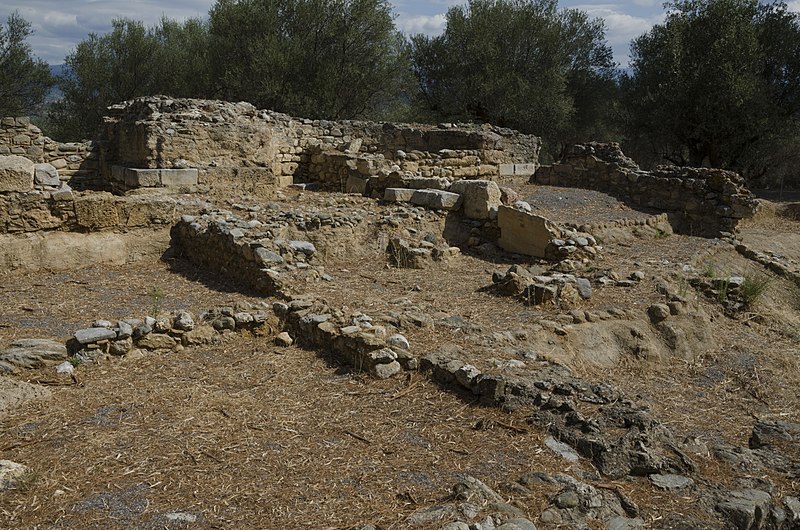Phintys, fr. 2, On a Woman’s Prudence by the Spartan Phintys, the daughter of Kallikrates the Pythagorean (=Stob. 4.23.61)
“It is also necessary for a woman to take to heart that she will find no kind of purifying remedy for this mistake [adultery], something that would allow her to approach the temples and altars of the gods as a chaste and god-loved woman. This is because in this crime especially the divine spirit is most unforgiving. The most beautiful achievement of a free woman and the foremost glory is to provide as testimony to her prudence toward her husband her children, if they do in fact bear the imprint of similarity to the father who sowed them. That seems to me to be enough regarding marriage.
The following seems to be right to me when it comes to the management of the body. A woman should wear white, but be dressed simply and without decoration. This style of dressing is achieved without transparent or decorated robes or robes which are made from silk; instead a woman should wear modest and white clothing. She preferably also avoids luxury and ostentation and will not cause vile jealousy in other women. She should also not put on gold or emeralds at all—this behavior would make her seem wealthy and haughty to common women.
It is necessary that the well-governed city which is ordered completely with a view to its whole should be one of common experiences and likemindedness. And it should keep out the craftspeople who create these sorts of baubles from its territory. A prudent woman should not embellish her appearance with foreign decoration and makeup but should use the native beauty of the body—she should decorate her body by washing it in water rather than bringing it shame. For this brings honor to herself and the man she lives with.
Women need to make processions from their homes to make sacrifices to the leading-god of the city for themselves, their husbands, and their households. They must make their expedition to the theater or to the market for household goods, however, not when the evening star is rising nor when it is dark but whenever it is still light, accompanied by a single servant or, at most, two as is proper.
In addition, a prudent woman must also perform sacrificial rites for the gods as is permitted to her, but must abstain from the occult rites and rituals of the Great Mother at home. For the common law prohibits women from performing these rituals, since, in addition to other things, these practices make them drunk and insane. The woman of the home needs to be temperate and uncontaminated by everything, even when she is governing the home.”
Κἀκεῖνο δὲ χρὴ διαλογίζεσθαι, ὡς οὐδὲν καθάρσιον εὑρήσει τᾶς ἀμπλακίας ταύτας ἄκος, ὥστε ὡς ἱερὰ θεῶν καὶ βωμὼς ποτερχομέναν ἦμεν ἁγνὰν καὶ θεοφιλάταν· ἐπὶ γὰρ ταύτᾳ τᾷ ἀδικίᾳ μάλιστα καὶ τὸ δαιμόνιον ἀσυγγνωμόνητον γίνεται. κάλλιστος δὲ κόσμος γυναικὸς ἐλευθέρας πρᾶτόν τε κῦδος τὸ διὰ τῶν αὑτᾶς τέκνων ἐπιμαρτύρασθαι τὰν σωφροσύναν τὰν ποτὶ τὸν ἄνδρα, αἴκα τὸν τύπον τᾶς ὁμοιότατος ἐπιφέρωντι τῶ κατασπείραντος αὐτὼς πατρός. καὶ περὶ μὲν εὐνᾶς οὕτως ἔχει· περὶ δὲ τῶ κόσμω τῶ περὶ τὸ σῶμα δοκεῖ μοι οὕτως.
δεῖ λευχείμονα ἦμεν καὶ ἁπλοϊκὰν καὶ ἀπερίσσευτον. ἐσσεῖται δὲ τοῦτο, αἴκα μὴ διαφανέεσσι μηδὲ διαποικίλοις μηδὲ ἀπὸ βόμβυκος ὑφασμένοις χρᾶται τοῖς περὶ τὸ σῶμα, ἀλλὰ μετρίοις καὶ λευκοχρωμάτοις· οὕτω γὰρ τὸ μᾶλλον κοσμεῖσθαι καὶ τρυφὰν καὶ καλλωπισμὸν φεύξεται, καὶ ζᾶλον οὐκ ἐμποιήσει μοχθηρὸν ταῖς ἄλλαις. χρυσὸν δὲ καὶ σμάραγδον ἁπλῶς μὴ περιτίθεσθαι· καὶ γὰρ πολυχρήματον καὶ ὑπεραφανίαν ἐμφαῖνον ποττὰς δαμοτικάς.
δεῖ δὲ τὰν εὐνομουμέναν πόλιν, ὅλαν αὐτὰν δι’ ὅλας τεταγμέναν, συμπαθέα τε καὶ ὁμοιόνομον ἦμεν, ἀπερύκεν δὲ καὶ δαμιοεργὼς ἐκ τᾶς πόλιος τὼς ἐργαζομένως τὰ τοιαῦτα. χρώματι δὲ φαιδρύνεσθαι τὰν ποτῶπα μὴ ἐπακτῷ καὶ ἀλλοτρίῳ, τῷ δ’ οἰκῄῳ τῶ σώματος δι’ αὐτῶ τῶ ὕδατος ἀπολουομέναν, κοσμὲν δὲ μᾶλλον αὑτὰν αἰσχύνᾳ·
καὶ γὰρ τὸν συμβιῶντα καὶ αὑτὰν ἔντιμον παρέξεται. τὰς δὲ ἐξόδως ἐκ τᾶς οἰκίας ποιεῖσθαι † τὰς γυναῖκας τὰς δαμοτελέας θυηπολούσας τῷ ἀρχαγέτᾳ θεῷ τᾶς πόλιος ὑπὲρ αὑτᾶς καὶ τῶ ἀνδρὸς καὶ τῶ παντὸς οἴκω· ἔπειτα μήτε ὄρφνας ἐνισταμένας μήτε ἑσπέρας ἀλλὰ πλαθυούσας ἀγορᾶς καταφανέα γινομέναν τὰν ἔξοδον ποιεῖσθαι θεωρίας ἕνεκά τινος ἢ ἀγορασμῶ οἰκῄω μετὰ θεραπαίνας μιᾶς ἢ καττὸ πλεῖστον δύο εὐκόσμως χειραγωγουμέναν.
τὰς δὲ θυσίας λιτὰς παριστάμεν τοῖς θεοῖς καὶ καττὰν δύναμιν, ὀργιασμῶν δὲ καὶ ματρῳασμῶν τῶν κατ’ οἶκον ἀπέχεσθαι. καὶ γὰρ ὁ κοινὸς νόμος τᾶς πόλιος ἀπερύκει ταῦ<τα> τὰς γυναῖκας ἐπιτελέν, καὶ ἄλλως καὶ ὅτι μέθας καὶ ἐκστάσιας ψυχᾶς ἐπάγοντι ταὶ θρησκεύσιες αὗται· τὰν δ’ οἰκοδέσποιναν καὶ προκαθεζομέναν οἴκω δεῖ σώφρονα καὶ ἀνέπαφον ποτὶ πάντα ἦμεν.


